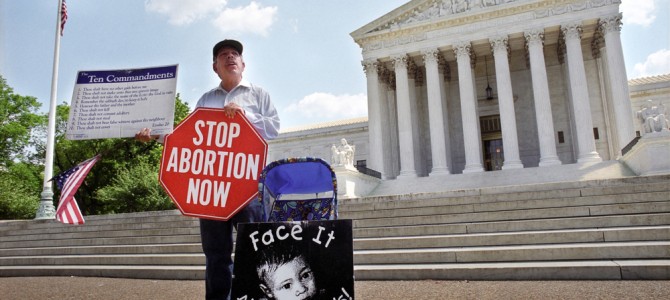
On March 2 the Supreme Court will hear arguments in Whole Woman’s Health v. Hellerstedt, a challenge to a Texas law requiring abortionists to adhere to the same basic, common-sense health and safety standards as similar surgical centers. Justice Antonin Scalia’s death means the eight remaining justices will decide whether the Constitution affords a “right” to a less “safe” abortion.
What the Court won’t be asked to decide, however, may be even more noteworthy—and should raise questions about the abortion industry and its arguments both in Whole Women’s Health and for any nominee who would replace Justice Scalia.
Almost three years ago the Texas legislature enacted HB2, the principle components of which are (1) restricting abortions after 20 weeks, when we know the unborn child can feel pain; (2) requiring abortionists to comply with the Food and Drug Administration’s approved protocol on chemical abortions; and (3) ensuring that abortionists would have to comply with basic health and safety standards. The uproar made national headlines, with pro-abortion protesters chanting “Hail Satan” at praying pro-lifers, screaming inside the state Senate chamber to try to disrupt it, and even bringing jars of excrement—thankfully confiscated—into the chamber.
The controversy launched stardom for Wendy Davis, the state senator national abortion activists celebrated as the face of the opposition before Greg Abbott trounced her in the governor’s race. Davis’s opposition to the bill largely focused on its restriction of abortion on pain-capable unborn children after 20 weeks, claiming such a limitation on later-term abortions would endanger women who need these abortions for “health” reasons.
Abortion Supporters Don’t Challenge 20-Week Bans in Court
Yet, almost three years later, this prohibition on abortions after 20 weeks remains unchallenged. It has been Texas law since October 2013. The Court will not consider that part of the law because the abortion industry, despite its claims about harm to women and Wendy Davis’s rhetoric, has chosen not to challenge it. It’s not an oversight. MSNBC reported there is
…a strategic reason to avoid challenging that [20-week] ban…. [A] Texas challenge would go to the conservative Fifth Circuit. Not only would that court potentially uphold the law…, the combination of decisions would create a split in the circuits that would make the Supreme Court likelier to hear it.
Texas isn’t the only state where abortion activists have talked tough but declined to challenge these laws. Fifteen states have enacted similar laws. The abortion industry has chosen only to challenge them in the Ninth Circuit and a Georgia state court. In none of those 12 states where the laws are in effect is there a known example of any harm to any woman.
For decades the abortion industry challenged laws by assertion—having their own abortionists use their medical credentials to forecast imminent harms to women. But in recent years courts have refused to take abortionists at their word, freeing legislatures to make those factual judgments instead. Abortionists can choose to avoid court, but they can’t also pretend that their rhetoric about these laws harming women’s health is based in reality if they challenge these laws years hence after their claims have been tested and disproven daily.
Calling the Abortion Industry’s ‘Health’ Bluff
Likewise, when the Supreme Court considered the constitutionality of the Partial-Birth Abortion Ban Act in 2006, abortionists argued that approximately 2,200 partial-birth abortions per year were necessary for health reasons. This was important because the law lacked any health exception (except to save the mother’s life). When the Supreme Court issued its 5-4 opinion in Gonzales v. Carhart almost nine years ago in April 2007, it held that the law was facially constitutional.
But it also called the abortion industry’s bluff. The Court invited any abortionist or woman to file a new challenge showing why a partial-birth abortion was necessary in one of those 2,200-per-year (six per day) instances. Planned Parenthood warned of consequences for women’s health from the decision. Justice Ginsburg wrote in a dissent: “One may anticipate that such a pre-enforcement challenge will be mounted swiftly, to ward off serious, sometimes irremediable harm, to women whose health would be endangered by the intact D&E prohibition.”
Yes, one would “anticipate.” Unless none of it was true.
Nearly nine years later, no such complaint has been filed nor is there any evidence any woman was harmed by not being able to have a partial-birth abortion procedure in that time. There are four possible reasons: (1) by incredible fortune, the threats to women’s health making partial-birth abortion necessary ceased on April 18, 2007; (2) Women are harmed daily, but Planned Parenthood and the abortion industry lack the resources to file the Supreme Court’s invited lawsuits; (3) the claim that partial-birth abortion was necessary to protect women’s health was a lie; or (4) the abortion industry routinely violates the law.
March 2 will be the 3,241st day since the Court upheld the PBA Ban Act. Using the abortion industry’s own figures of roughly six partial birth abortions per day, that decision will have prevented 19,446 partial-birth abortions—without a single one resulting in an as-applied challenge or even a public disclosure of harm to a woman.
When the Supreme Court addresses the Texas law March 2 and assesses the veracity of the abortion industry’s new claims about threats to women’s health, it will now have the benefit of years of real-world tests, showing the abortion industry cannot be trusted.
Beware Obama and Clinton Supreme Court Appointees
Should President Obama nominate a replacement for Justice Scalia, there is no reason for the Senate to even hold a hearing. It should not, given Obama’s admission that his nominee will be no moderate. But even if the Senate unwisely holds such a hearing, the nominee should be asked not only about partial-birth abortion and similar practices in theory, but also about the near decade of factual evidence that the abortion industry was lying.
Hillary Clinton has already signaled she opposes the Partial Birth Abortion Ban Act and would presumably nominate a justice to reverse the decade-old precedent and allow them again.
In Justice Kagan’s Supreme Court confirmation hearings she was questioned about the revelation that as White House policy advisor she actually changed the position statement of the American College of Obstetricians and Gynecologists to bolster opposition to the Partial-Birth Abortion Ban Act. We now know the claim about the necessity of partial-birth abortion for women’s health was factually false. Every day adds to the nearly 20,000 pieces of evidence that the abortion industry and its defenders were simply wrong.
As the Supreme Court evaluates the Texas law and President Obama asks Congress to confirm a replacement for Justice Scalia, abortion activists and their defenders are entitled to their own opinions, but not their own facts.









